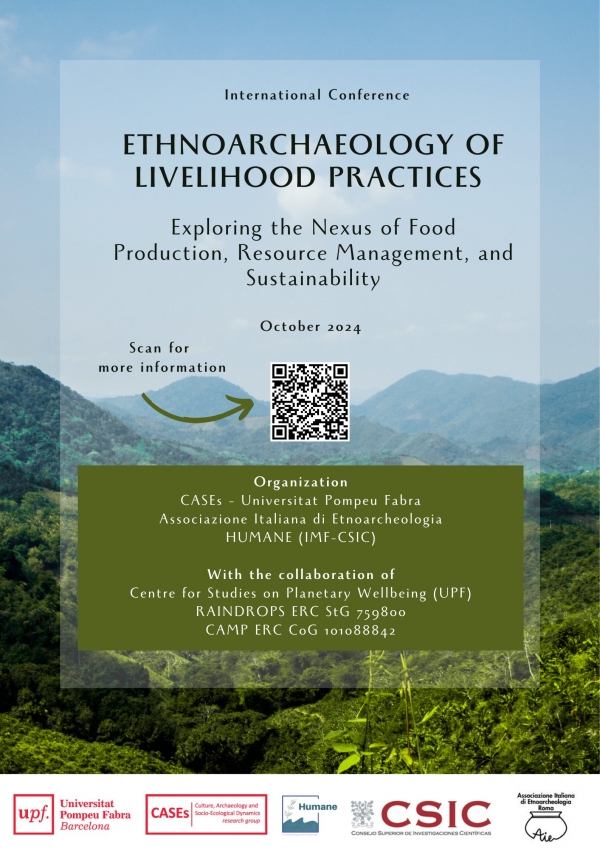Project
Exploring the Nexus of Food Production, Resource Management, and Sustainability
10/16-18/2024
UPF CAMPUS DE LA CIUTADELLA, CARRER DE RAMON TRIAS FARGAS, BARCELONA, SPAIN
Organized by Stefano Biagetti, Carla Lancelotti, Debora Zurro, Francesca Lugli
Long time has passed since the previous conference on Ethnoarchaeology organized by the Italian Society for Ethnoarchaeology in Rome (2015), and during this period, the world has undergone profound transformations. New challenges have arisen, demanding our attention, while other pressing issues have emerged on the global stage.
In the current scenario, characterized by the dominance of climate change and uncertainties in the political and economic realms, it is increasingly clear that the Western scientific worldview requires adjustments to effectively address the current global challenges we face. In contrast, traditional livelihood practices offer sustainable and time-tested alternatives to the mainstream perspective of livelihoods. These practices, often disregarded and at risk of disappearing, hold valuable knowledge and potential solutions. Recognizing their significance is crucial for fostering a more comprehensive understanding of our relationship with the environment and its resources.
It is time to recognize that ethnoarchaeological research has played a crucial role in challenging Euro-centric perspectives and expanding our understanding of cultural development among indigenous people across time and space. By shifting the focus from external influences to intrinsic factors within indigenous cultures, ethnoarchaeology has brought forth a more nuanced understanding of the dynamics and complexities of cultural evolution. In this scenario, we are therefore thrilled to announce the upcoming international conference on the Ethnoarchaeology of Livelihood Practices: Exploring the Nexus of Food Production, Resource Management, and Sustainability.
This interdisciplinary event brings together scholars from diverse fields to delve into the realms of agricultural systems, pastoral traditions, and foraging strategies. The aim of the conference is to analyze how various food production practices intricately intertwine with the management of resources, and sustainability and explore their profound impact they had over time on our environment, communities, and heritage. we celebrate the transformative impact of ethnoarchaeology in challenging established narratives and advocating for a more inclusive and comprehensive approach to studying cultural development. It aims to be a 'traditional' meeting format where participants convene for discussions and presentations. In any case, the conference will be live streamed.
Peter the Great Museum of Anthropology and Ethnography (Kunstkamera) of the Russian Academy of Science (MAE RAS, St Petersburg, Russia); Italian Association for Ethnoarchaeology (AIE, Rome, Italy); Institute of Archaeology and Ethnography of the Siberian Branch of the Russian Academy of Science (IAET SB RAS, Novosibirsk, Russia); The International Association for Mediterranean and Oriental Studies (ISMEO, Rome, Italy); Italian Embassy in Moscow; Italian Institute of Culture in St Petersburg
HUMANS AND ANIMALS: PARADOXES OF MUTUAL RELATIONSHIPS
St Petersburg (Russia) 29 November — 2 December 2021
Paradoxes of Mutual Relationships International Conference
Peter the Great Museum of Anthropology and Ethnography (Kunstkamera) of the Russian Academy of Science (MAE, St Petersburg, Russia)
Italian Association for Ethnoarchaeology (AIE, Rome, Italy)
Institute of Archaeology and Ethnography of the Siberian Branch of the Russian Academy of Science (IAET, Novosibirsk, Russia)
ISMEO – The International Association for Mediterranean and Oriental Studies (Rome, Italy)
HUMANS AND ANIMALS: PARADOXES OF MUTUAL RELATIONSHIPS
St Petersburg (Russia) 29th - 30th November, 2021
Peter the Great Museum of Anthropology and Ethnography (Kunstkamera), Russian Academy of Sciences (University Embankment 3, St Petersburg, Russia)
The Italian Association for Ethnoarchaeology (AIE)
1st INTERNATIONAL CONFERENCE
DOGS - PAST AND PRESENT
An interdisciplinary perspective
Rome, 14th-17th November, 2018
National Research Council (CNR)
Sala Convegni, via dei Marrucini snc
14th-16th November
Museo dell’Arte Classica - Facoltà di Lettere
Sapienza Università di Roma
Aula Odeion, piazzale Aldo Moro 5
17th November
© 2025 Ethnoarchaeology

